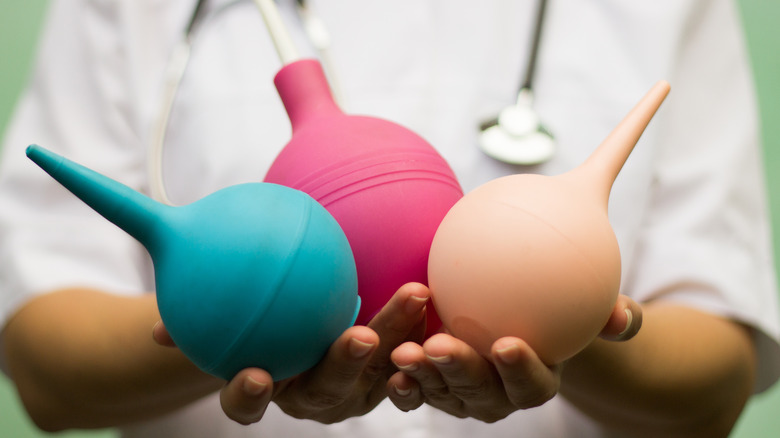A Gastroenterologist Weighs In On The Safety Of Colon Cleanses
After a week of eating unhealthy, you feel a good detox might be in order to rid your body of all the nasty toxins in your belly and restore your gut health. Then you remember someone telling you how revitalized they felt after a colon cleanse. The practice of colonic cleansing, often referred to as colon hydrotherapy or irrigation, has been a method of detoxifying the body for centuries. During the process, water is gently injected into the rectum in order to flush out any built-up toxins. But does flushing out toxins actually work? Is it safe?
Dr. Kenneth Brown, a renowned gastroenterologist in Plano, Texas and the host of the Gut Check Project podcast, gives us his take on the safety of colon cleanses. In his practice, Dr. Brown uses a mix of traditional medicine and natural therapeutics to treat patients suffering from gastrointestinal issues.
"The idea behind colon cleansing is that it can help to remove toxins and waste products from the colon, thereby improving overall health and wellbeing," Brown said. "However, it is important to note that there is limited scientific evidence to support the effectiveness of colon cleansing, and it may carry risks."
Our body is a natural detoxifier
Whether you realize it or not, your colon is more important than you think. "The human body is designed to naturally eliminate waste products and toxins and the colon plays a crucial role in this process," explains Dr. Brown. However, a colon cleanse could throw our body's natural detoxifying process into disorder. "Colon cleansing can disrupt the natural balance of the microbiome bacteria in the colon, leading to many issues which can become chronic and cause disease," Brown said. "Additionally, colon cleansing can cause dehydration and electrolyte imbalances, leading to complications such as kidney damage, irregular heartbeat, and seizures."
Aside from what the procedure can do to the body, the tools used in the process are just as important. "In the case of colon hydrotherapy, the equipment used for colon cleansing may cause injury to the colon or rectum, leading to bleeding or infection," Brown said.
Little evidence for the effectiveness of a colon cleanse
In addition to the risks, Brown adds that any benefits of a colon cleanse are just testimonials rather than scientific research. "The bottom line is that there is no evidence to support the idea that colon cleansing can improve overall health or prevent disease," Brown said.
However, if you still want to try a colon cleanse, it's important to talk to your healthcare provider first, particularly if you take any medications or have another health condition. Brown says to ensure the safety and effectiveness of a colon cleanse, use only equipment and products approved by the Food and Drug Administration. That will cut your risk of infection or other complications. Brown also suggests drinking plenty of fluids because colon cleanses can cause dehydration and an imbalance of electrolytes. Finally, Brown says to follow the instructions on the colon cleansing kit since overusing or misusing the products can cause complications. It's also best to do a colon cleanse under a medical professional's supervision.



